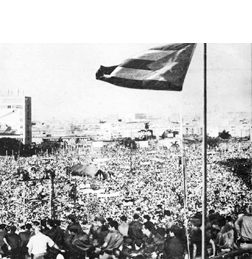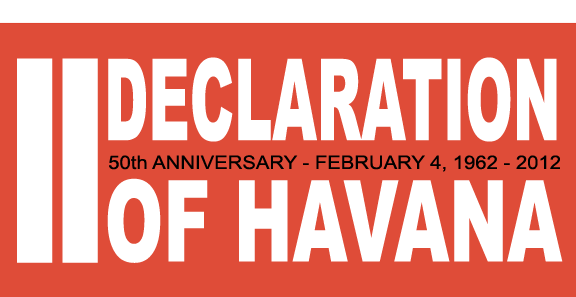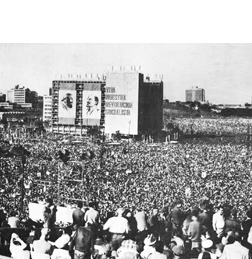


| La Segunda En Sus Cincuenta | |
|
February 4, 2012 will mark the 50th anniversary of the delivery of La Segunda Declaración de La Habana, one of the most important documents in the history of Latin America. On this date in 1962, the third year since the triumph of the Cuban Revolution, Fidel Castro presented La Segunda Declaración to the 2nd National General Assembly of the Cuban people. One million supporters representing every sector of revolutionary Cuban society had gathered in Havana’s Plaza de la Revolución to vote on this declaration, in the end offering their approval to its message that was intended to engage with and inspire not only the people of Cuba but the population of all Latin America, the United States, and to a significant degree a global audience – in 1962 anticolonial national liberation struggles were taking place on every continent. Acutely aware of the transcendental significance of the moment, Fidel suggested to the multitude in his opening remarks, “...preste el pueblo atención a cada palabra, a cada frase... de esta Segunda Declaración...”, since each of its 1,400 lines had been enriched with historical meaning, and within its words became embodied the combative spirit of the time. This project is designed from the outset as an effort to reveal the accumulated ideological insight and latent political audacity infused within the text, making evident its temporally transcendental characteristics. |
La Segunda Declaración carries within its words the urgency of a period of continental transformation, and although historically situated, the text still shelters the potentiality of a modern redeployment of this combative spirit. This project proposes more than a commemoration of an important document, but a reconstitution of an historical context and affective re-connection and to an historical memory and validation of political struggle. The story of Latin America after La Segunda Declaración, particularly between the late 1970s to the 1990s, is one of historical disruption - the disarticulation of a generation of people who struggled in their time to transform a continent. This generation of militantes thought about their political and cultural work in this way, as represented by the work of Santiago Álvarez and from movements such as Tercer Cine. Until the contradictions, crisis, and human suffering described in the 1962 document are finally resolved and overcome, then it should not be classified as an historical document, but as a manifesto for Latin American liberation struggle. With this in mind, this project will be historically situated yet pedagogical in its organization and delivery, and agitational in its spirit. This is the logic behind the three facets to this media resource, engaging with the Past, Present, and Future of La Segunda Declaración de la Habana. |
| Past (In Spanish)
The first section will be historical in nature, celebrating the 50th anniversary of La Segunda Declaración de La Habana as a manifesto for Latin American liberation struggle. Beginning with the idea that its content is largely a reflection of its context, La Segunda Declaración is representative of the creative disposition and political audacity that defined the period between 1959 and the early 1970s in Latin America. The intention of this first section of <segundadeclaracion.net> is to provide a media rich link to a combative and inspired historical moment, utilizing the original text of the 1962 Declaración as a foundation upon which to construct a more expansive pedagogical and agitational project. A close examination of the context of this period in Latin America is necessary to fully appreciate the continental historical memory embodied within La Declaración, and it has an important role in its recovery. Short of such an analysis La Declaración is reduced to and classified as a sample of idealistic radical discourse, excavated from a distant and troubled time, archaic and irrelevant to current conditions. Too often this is a reduction proposed among Latinamericanist scholars and even among progressives. Consequently, accumulated political and ideological experiences and practical contributions of a generation of Latinoamericanas/os remain largely disarticulated and marginalized, initially as a product of the violent purging of political radicalism from the Latin American collective consciousness during the 1970s, and later, as an accommodation to the Washington consensus. The Latin Americanist historical memory embodied within La Declaración is all the more desirable and urgent in light of its displacement by policy driven market fundamentalism, which is co-constitutive of the unrestrained consumerism and horizontal violence that is today undermining many countries throughout the region. Providing an expanded accessibility to the original text, delivered simultaneously with audio and video versions, is useful for a close reading of its content, and not only fulfills the original spirit of La Declaración, but surpasses it since this ease of delivery was impossible in 1962. Moreover, documenting the authorship and original intention of the text and its influence on individuals, organizations, and movements throughout Latin America underscores an important theoretical argument that is at the center of this project -- the significance of an historical memory and the cumulative value of history itself should not be underestimated, particularly when considered in relation to current political struggles. With this in mind, this section will include a series of interviews with people who were active in Latin American revolutionary politics during the 1960s and 1970s. Motivated and inspired by the text when they first came across it, these individuals will be asked to provide insight and commentary on specific sections, and to highlight how they engaged politically with the document during that period of liberation struggle throughout the region. This section will be expanded as the project is developed. Currently most of the material is in Spanish, and the links will take you to pages primarily in Spanish until the English versions can be developed and uploaded. Go to Pasado.
|
Present
The second facet of this project involves the recovery and revitalization of the text within the present conditions of Latin America. This will include the following elements:
This section will be educational and agitational in character, thus openly advocate for participants to become active politically in their own region and context. This section will be added as the project is developed. |
Future
The third facet will be more interactive in nature, providing a space for participants to contribute and expand the online version of this project. This will be a redeployment of the text among current generation of Latinamericanists, where individuals and collectives will be able to “perform” their interpretation to sections of the original text, modeling a form of “people’s theatre”, and this will be followed up with a reflection on the text and their engagement with it. This process will thereby promote the externalization and re-internalization of the text, prompting critical reflection on its past and present significance, helping to visually re-capture the potency of the original document as articulated in the previous section (Present). This will serve as confirmation of a new engagement with La Segunda Declaración de La Habana, repositioning it in relation to current conditions in Latin America, and newly engaged with through the eyes of young people and thereby possible future solutions. Finally, this section will serve to bridge the temporal gap between the older individuals interviewed in the historical section and a new generation of Latinamericanists, placing them in a virtual dialogue about political engagement and the challenges of radical transformation. The three component parts of <segundadeclaracion.net> will serve a purpose when navigated independently and as distinct modules. Yet, the full pedagogical and agitational experience would be most thoroughly developed when users actively participate in and enrich the three sections as a unitary whole. At the point in the evolution of this effort when each of the three sections can stand alone as distinct modules, another layer of navigation will be added to integrate them horizontally and vertically into a singular online pedagogical and agitational project. This section will be added as the project is developed. |
- home - info@segundadeclaracion.net -
04/2011